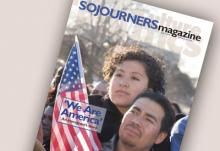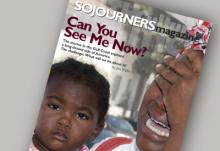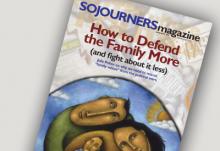Music
This day is filling up my room,
Is coming through my door.
Oh, I have not seen this day before.

He seems relatively amused when people quote lines from the most famous song he’s ever recorded, but this day he was pretty serious.
Every movement needs its revolutionaries and spokespersons, and in the growing crusade for a healthy, ethical, and “fair” food system, Bryant Terry and Anna Lappé happen to be both. Terry is a chef and founder of b-healthy! (Build Healthy Eating and Lifestyles to Help Youth)—a nonprofit group in New York that teaches low-income kids not only about nutrition, but also how to prepare healthy food themselves. Lappé is a writer, speaker, and co-founder (with her mother, Frances Moore Lappé) of the Small Planet Institute and Small Planet Fund. The latter supports grassroots efforts around the world that address the causes of hunger and poverty.
The two packed their passion and experience into Grub: Ideas for an Urban Organic Kitchen, a practical book that explains why our food system is the way it is, but also what we can do to change it. And don’t be surprised if, along the way, you pick up a few tips about cooking (pepper grinders are key) and music (Césaria Évora is nice accompaniment to cinnamon-dusted sweet potato fries). Associate editor Molly Marsh spoke recently with the author-activists.
Sojourners: So why the name Grub? What is grub?
Bryant Terry: When Anna and I started working on this project, we had so many people tell us that healthy organic food is for wealthy baby boomers. That’s a common misconception. We wanted people to understand that grub—healthy, local, sustainable food—is food that’s accessible to everyone. It’s something all people have a right to.

A trip to Africa produces a holy shake-up, and a new tune, for Jars of Clay.

To sing or to die: now I will begin. There’s no force that can silence me. —Pablo Neruda, “Epic Song”
In a world so torn by poverty and war, perhaps music can seem like a secondary concern. But as Christians know so well, music feeds the spirit, comforts the downtrodden, strengthens the weary, and can give words a power they do not possess on paper. Imagine life without your favorite hymn or the song that safely channeled your teenage rebellion, or the anthem of peace or protest that still stirs you. Imagine life without Bach or Handel, or Neil Young, or Billie Holiday singing “Strange Fruit” (dismissed in its day by Time magazine as “a prime piece of musical propaganda”).
Imagine if someone literally took away your song. Wouldn’t you hunger for it like bread?
When a government or powerful religious or ethnic group tries to turn off the music, the stakes are high. Music is another way to hear the news and a means to find common passion between very different peoples. In this way silence, or a restricted diet of state-approved tunes, can diminish us. But the more immediate and sometimes tragic cost is borne by the artists around the globe who have faced intimidation, loss of livelihood, imprisonment, torture, and even death for recording, performing, or distributing their music:
- South Africa revoked singer Miriam Makeba’s citizenship and right of return after her 1963 testimony about apartheid before the United Nations.
- Populist Chilean folk/political singer and songwriter Victor Jara was one of several musicians who supported the successful 1970 campaign of Salvador Allende to become president of Chile. When a 1973 military coup overturned the Allende government, Jara was among the thousands of citizens subsequently tortured and executed. His torturers reportedly broke his hands so that he couldn’t play his guitar; his final lyrics, written on scraps of paper during the few days before he was killed, were smuggled out by survivors.
